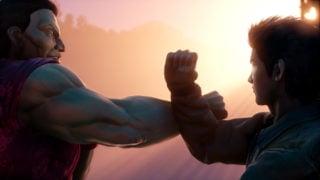Shenmue 3 shows what games have lost since 2001
Big-budget games from design mavericks used to be the norm, but not anymore…
Steve Boxer

Like a ship drifting out of the Bermuda Triangle after disappearing 18 years ago, Shenmue III is now – miraculously, for anyone who was already a gamer at the start of the millennium – on sale.
Its relative merits and inherent quality – it contains flaws that are all too apparent, but could be the result more of underfunding than poor development – can be debated ad infinitum. But surely nobody would disagree that its status as a preserved-in-aspic relic of what games were like nearly twenty years ago provides a unique opportunity to add some context to today’s games industry.
Playing Shenmue III with modern games in mind raises a number of issues and observations. The first thing that leaps out at you when you fire it up is how slow it is. Sure, in 2001, there were already plenty of games that offered non-stop, wall-to-wall action, but it’s something of a revelation to find a game in 2019 that builds so slowly and methodically, revealing its game-world bit by bit and unfolding its many game mechanics one by one.
Anomalously slow
Shenmue III’s measured – even tranquil and soothing – gameplay almost feels like a pointed commentary on today’s games, with their laser-focus on instant gratification and unrelenting action.
It’s the polar opposite of the likes of Fortnite, Overwatch, PUBG, Apex Legends and the like, which place action on so high a pedestal that any form of narrative or sense of ebb and flow dwindles to microscopic proportions.

It’s difficult to imagine any other game being released in this day and age that, for example, would populate itself with uncooperative characters who must be cajoled into telling you or teaching you what you seek. Shenmue III feels brave in that respect and through it, creator Yu Suzuki seems to be indulging in an unflattering commentary on the insatiable modern craving for a constant string of dopamine hits.
He isn’t actually doing that, of course – he’s just making the game he envisaged in 2001, whose gameplay follows on directly from the first two Shenmue games. But if Suzuki was starting out now, it’s difficult to envisage any major publisher doing anything other than forcing him to make Shenmue III’s gameplay much more action-oriented.
Going online post-2001
Looking back to the games that came out in 2001, alongside Shenmue II, action titles still dominated. It was a pretty vintage year for games, by any criteria: Grand Theft Auto III, Devil May Cry, Halo: Combat Evolved, Max Payne, Metal Gear Solid 2 and Silent Hill 2 all made their debuts.
But that year also saw the release of plenty of highly original games, with unconventional gameplay and often created by mavericks, yet published by big beasts. Among those were Ico, a PlayStation 2 exclusive whose gameplay was every bit as sedate as that of Shenmue II, Peter Molyneux’s highly experimental Black & White (published by Electronic Arts) and the deliciously scatological (and very British) Conker’s Bad Fur Day (published by the very Japanese Nintendo).
“Gaming’s online shift has meant that developers and publishers can now rake in large amounts of money by building huge open worlds and putting a few systems in them, without having to think about tricky aspects of development such as narrative.”
It’s clear from that list that publishers – and especially the biggest ones – were much less risk-averse eighteen years ago than they are now. That shift is partly explained by the rise of online gaming which, in 2001, was in its very infancy, on consoles at least. Sega’s Dreamcast was the first console to run an online game – Chu Chu Rocket – while even though the Xbox was launched at Christmas 2001, Xbox Live didn’t arrive until 2002.
In the intervening 18 years, gaming’s online shift has meant that developers and publishers can now rake in large amounts of money by building huge open worlds and putting a few systems in them, without having to think about tricky aspects of development such as narrative. Loot boxes and paid-for DLC mean that they can also generate income from those games for longer periods, so it’s small wonder that experimentation has more or less been abandoned to the indies.
What happened to the auteurs?
Another aspect of the games industry that appears to have changed since 2001 is that the stranglehold exercised by the great videogames auteurs has declined.

As well as Suzuki with Shenmue II, 2001 saw games from Shinji Mikami, Peter Molyneux, Fumito Ueda, Hideo Kojima, Kazunori Yamauchi with Gran Turismo 3 A-Spec, Sid Meier with Civilisation III and the emergence of Sam and Dan Houser at Rockstar Games (taking over the previously top-down GTA franchise from the great Dave Jones).
Sure, Kojima is still doing his thing in magnificently maverick fashion, the Housers are taking their own sweet time, as ever, Michel Ancel is finally working on Beyond Good & Evil 2 and some on that list have made more money than they need in the intervening 18 years, but any new developers who have emerged in recent years with distinctive visions have tended to operate in the indie development space. Which breeds the suspicion that among the top publishers, the practice of designing games by committee is now rife.
Making the game you envisage
Returning to Shenmue III, its all-too-glaring flaws of patchy animation and poor dialogue twinned with dodgy voice-acting on the face of it highlight two aspects of videogame design which have improved immeasurably in the last 18 years. When it comes to in-game characters, we now demand a level of realism and believability which simply wasn’t possible with 2001’s technology.
But those flaws also highlight another aspect of the modern games industry: funding. Yu Suzuki, famously, was used at the turn of the millennium to working with some of the most lavish budgets ever seen in the games industry. With Shenmue III, he managed to raise a highly impressive $7 million via Kickstarter, and Sony and publisher Deep Silver also contributed to his fighting fund.
However, those sums are a far cry from the ones Suzuki was once used to having at his command, and one suspects (and hopes) that operating on a shoestring while still entertaining a lavish vision for his game constitutes the real reason behind Shenmue III’s disappointing elements.
“When it comes to in-game characters, we now demand a level of realism and believability which simply wasn’t possible with 2001’s technology. But those flaws also highlight another aspect of the modern games industry: funding.”
One other aspect of everyday life beyond videogames that has changed forever since 2001 is the advent of social media, with its attendant trolls and snarkiness, and that, in turn, has been reflected in the critical community, which feels ever keener to dismiss as worthless anything which isn’t demonstrably perfect.
Playing Shenmue III, I was constantly aware of its shortcomings, yet it still provided vast amounts of enjoyment and satisfaction (and continues to do so – few games offer better opportunities for long, slow, luxurious second play-throughs).
Sure, I would never dream of describing it as a masterpiece, but it’s always advisable to remember that what really counts, as far as any game is concerned, is the amount of sheer joy that it gives you.
Looking forward to Shenmue 4
Shenmue III had another disappointing aspect: its ending, which was surprisingly abrupt and unsatisfyingly inconclusive. But even that ultimately didn’t feel like a let-down, since it was clearly designed to set up the premise for Shenmue IV.
We’ll be crossing all available digits in the hope that Suzuki-san will be able to find a higher level of funding to make that – in particular, enough money to fund a shit-hot animation team and hire the best dialogue writers in the business.
If he manages to do so – which must be a tiny bit questionable, since Shenmue III hasn’t exactly set the sales charts alight – then we’ll really get a chance to find out if he still deserves to be feted as a genius. Thus, the 20-odd year saga of Shenmue rumbles along.
















